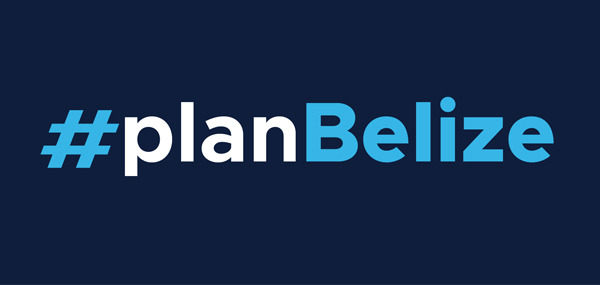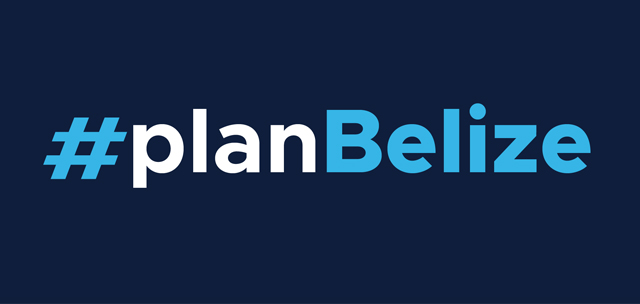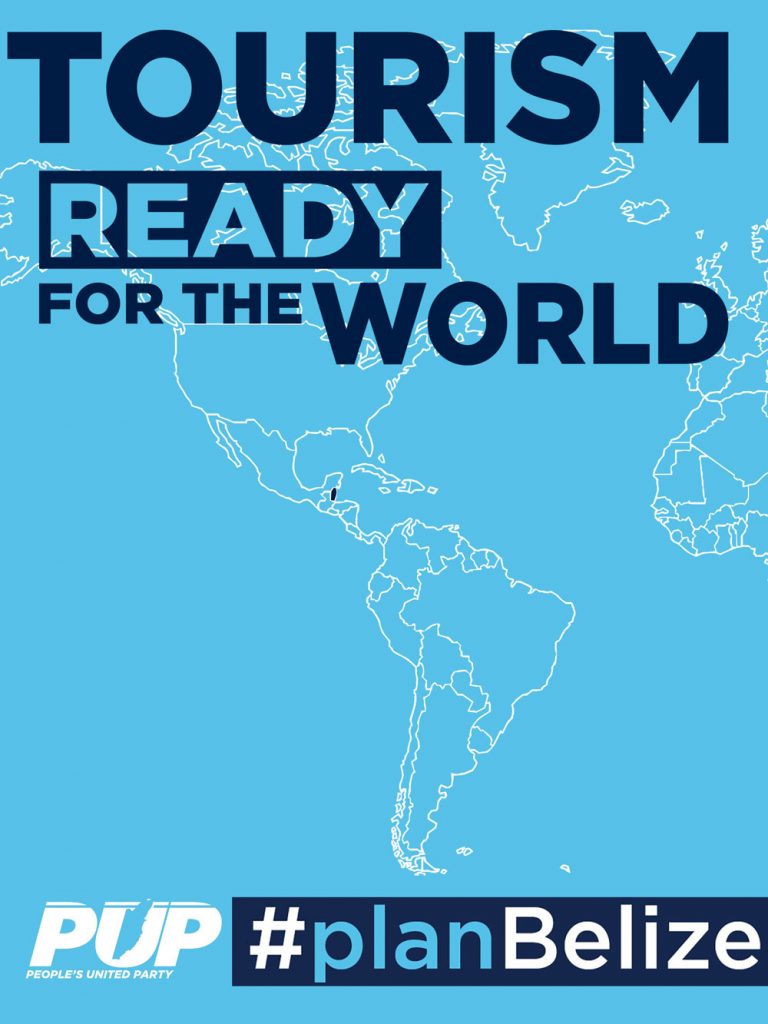TOURISM
POLICY PAPER
PEOPLE’S UNITED PARTY
Tourism is one of Belize’s main economic pillars, generating over 1 billion dollars in revenue. The industry is directly and indirectly responsible for 25% of the jobs in the country and is also the number one foreign exchange earner. However, Belize’s economy has become far too dependent on the tourism dollar, and that makes us vulnerable to any and all shocks, (local or exogenous) or disruptions in the industry.
Even though tourism has recorded growth over the years, there is still a tremendous amount of work to be done to ensure that this critical industry reaches its true potential. For example, overnight arrivals (land and air mainly) which are the drivers from a revenue standpoint, are supported by a very inadequate in-country transportation system; a hotel “plant” that is recording an occupancy rate that is hovering around 35 percent and with many not meeting international standards; and an inadequate number of quality restaurants. The international airport is second-rate; the rural/urban centers are seriously inadequate and need significant investments to become world-class. There is also a significant need for more trained people to manage and work in all aspects of the industry. Finally, crime and violence pose a clear and present danger to the tourism industry.
- To continue to build a first-class tourist destination with little interference to the natural and human resources;
- To create more equity throughout the tourism industry;
- To build a world-class brand where the name Belize is recognized and held in high regard;
- To ensure that Belizeans have an opportunity to invest and own their fair share of the tourism industry; and
- To maximize on the inter-sectoral linkages between tourism and other industries.
The purpose of this section of the paper is to stress the need for continued improvement of the tourism infrastructure to ensure that visitor satisfaction moves in an upward trajectory. It is also important for both the private and public sectors to become more strategic and creative when marketing the country internationally.
The tourism industry is comprised of a range of facilities, assets, people and institutions working in tandem to expose to the world the bountiful assets (human, natural and man-made) with which we have been blessed. The industry is comprised of four basic elements: accommodation and gastronomy facilities, sites and attractions, supporting infrastructure and the human resources needed to propel the industry forward.
There is need for new legislation, policies, standards and investments that will promote the integration of tourist services, maintain visitor numbers and encourage guests to stay longer, visit additional locations and increase their spending. It is critical that all ministries and government departments buy into what needs to be done in order for Belize to become a world-class tourist destination.
i. Upgrading the Hotel Plant
Even though the overnight sector of the tourism industry has grown with mainly boutique hotels, there is need to attract major 5 star branded hotels that will help to drive growth to the country. This can be achieved by utilizing partnerships between government and private sector. Government can use crown lands and cash as equity and the private sector can build and operate. Putting heads in beds is critical to the success of Belize as a destination and thus the focus will be to increase the national occupancy from the current rate of approximately 35% to 60% within 5 years.
ii. Tourism Education and Training
With almost 1. 7 million tourists visiting Belize annually, it has become necessary to introduce a training institute that will cater for line and skilled personnel. It is also important to partner with the tertiary level institutions to improve and expand the programs that are currently offered. Finally, it is important to work with the international certifying bodies so that we can build a strong cadre of trainers and people working in the tourism industry.
iii. Upgrading the Local Transportation System (mainly road)
Traveling through Belize by road is still difficult and there are still far too many dilapidated buses and other vehicles servicing the industry. There is a need for standards to be introduced but with the necessary incentives to assist with the improvements that are needed.
iv. Improving Safety
Crime continues to increase unabated and though most incidents occur against locals, far too many tourists have become victims in our country. There must be a national strategy to fight crime, especially in the larger tourist destinations. It is important to increase the number of Tourist Police and to provide the necessary training for them to be able to offer a superior level of customer service to the industry. There is also a need for a national emergency response team because we must improve the country’s preparedness to deal with health and environmental treats.
v. Investing in upgrading the infrastructure
The infrastructure in Belize lags far behind the country’s main competitors and it is critical that a comprehensive upgrade occur, which would aid in the development of the tourism industry. Below are the priorities:
- Build a new airport, including at least 3 jet bridges
- Upgrade the 2 main highways with the necessary markers and signage
- Open additional sites (manmade if necessary)
- Build proper medical facilities in San Pedro, Caye Caulker, Placencia
- Ensure that the necessary fire equipment is available in the major tourist areas
- Build a cruise port (docking facility) in Belize City
- Ensure that at least $150m spent over a 5 -year period on tourism related infrastructural projects
- Improve the sewer and water systems in important tourist destinations
- Ensure that all major tourist destinations have an adequate electricity supply
- Turn House of Culture into a National Garden
- Build a national aquarium
- Build a new Bliss Lighthouse with an observation deck
- Reclaim beaches in San Pedro and Caye Caulker
The growth experienced by the tourism industry in many countries has been driven by the development of air services. According to an essay on air transportation published by UKEssays, “The advances in aircraft technology, improvements in communications and information technology, and marketing strategies have improved the quality of air travel and reduced the price of air tickets so that the volume of traffic, particularly on longer routes, has doubled in each of the past three decades. The relationship between air transport and tourism is a highly complex subject involving an intriguing mixture of tourism accessibility, economic factors, and demand of low cost carriers.”
To ensure that Belize continues to record growth in the overnight sector, it is critical that new airline routes be established. The goal is to establish routes from the following target areas:
- Europe
- South America
- USA (West and East Coasts)
- Asia – (China, Japan and Taiwan)
Tourism destinations like Belize have become more focused on building a unique and competitive brand in the minds of consumers. Over the last 20 years, the Belize Tourism Board in tandem with its private sector counterparts (BTIA and BHA) have done well in positioning Belize and building awareness about the destination. In order to continue to grow as a destination, the marketing of Belize must continue to be innovative and strategic in reaching the target markets that are most interested in activities that the country has to offer. The reality is that great marketing does not happen by chance, but as a result of careful planning, understanding the strengths and weaknesses of the destination and by utilizing accurate data to drive the decision-making process.
New Marketing Initiatives
- Use virtual reality and augmented reality to promote the destination
- Use artificial intelligence to collect and promote the destination
- Develop a Belize App
- Use of more influencers like Big Baby Miller, Simone Biles, etc.
- Spend more on television ads in North America and Europe
- Revamp the country’s digital marketing strategy
In March of 2020, the Covid 19 virus literally locked down the entire world almost instantly and over the last seven months, the tourism industry like many others has been decimated. This means that trillions of tourist dollars have been wiped out of the world’s GDP. For Belize, this loss will total in the hundreds of millions of dollars which means that the Belizean economy and people will struggle for some time.
Today, many businesses are hemorrhaging and struggling to keep their doors open, and far too many employees have lost their jobs, are underemployed, or have had their salaries drastically cut. The People’s United Party is committed to being a safety net for the many businesses and the thousands of people who have worked tirelessly to help build the tourism industry in Belize. With that said, the PUP will allocate ten million dollars for tourism as part of our economic stimulus program.
Since the entire world is in the same situation as Belize, the public and private sector drivers behind the tourism industry must be innovative, creative and quick to devise and implement the strategies and policies that will assist in rebuilding the tourism industry and the critical sectors that support it. It is critical that the marketing campaigns (traditional and digital) show that Belize is different and safe to visit, especially since our product is one that is built for a more personal and unique visitor experience.
Tourism Industry Recovery Program | Digital Marketing
Within our Industry Recover Plan, we understand the current digital marketing shortcomings and while it will be a destination effort everyone will be encompassed.
Digital Couching/Training
During the recovery period, we will put together a team of global experts that will assess and provide updated information to help us leverage our resources and to reduce as much as possible the recovery period for the Jewel.
Social Media Influencer Campaign Paired with a Google Campaign
Launch the first COVID-19 influencer campaign targeting our primary markets to ensure that as the recovery occurs, we are in a position of priority in these markets. Documenting their travels will build consumer confidence and help to reduce those FAQ travelers have during these times.
Programmatic Media Buys
Belize has been for too long “out of Market” as we have seen little creativity in the past two years. We must produce new content, highlighting unique experiences, partnered with a robust digital media push.
Small & Medium Tourism Web
We understand that our small and medium tourism entrepreneurs need greater assistance in the digital space. Their digital footprint needs to be increased if we are to become a more competitive destination. By creating this online hub, we will be able to leverage a great destination online presence and have better representation online. The small and medium entrepreneurs will also benefit from our digital marketing recovery plan.
Cruise
Adopt – Implement – Improve!
There is no need to try to reinvent the wheel! The strategy is to adopt best case practices from regional as well as international cruise ports and make the necessary changes to ensure that they apply to Belize.
What we need to practice:
Tier 1: Testing…Screening…Exposure Reduction
Tier 2: Sanitation…Ventilation
Tier 3: Response (to alert of infection) …Contingency Planning & Execution
When we plan to restart, we need to:
- Request/require all cruise lines to submit COVID-19 SOP (Standard Operating Procedures) for cruising at earliest convenience before applying for itinerary booking in Belize
- Require Local Cruise Port(s) submit their plan for receiving cruise passengers, outline “corridors” as well as construct (if needed), identify, isolation areas and new sanitation protocols in regular and compromised scenarios as well as with reporting/mapping for contact tracing guidelines
- Require Ports to get COVID cruise visitor interaction training for all staff, security and retailers and have a certification of compliance to be renewed as is deemed necessary
- Expand secure “Bubble” tours with trained operators
We have identified the following private sector actions:
- Implement standardized health and safety protocols to facilitate a safe and consistent travel experience
- Develop and adopt new digital technologies that enable easy and safe travel and improve overall traveler experience
- Offer flexibility for bookings or changes such as waiving fees due to COVID-19 positive cases
- Offer promotions, more affordable products and services or greater value to encourage and promote domestic and international travel
- Adapt business models to the new global situation and collectively work to develop new products and solutions to boost domestic and international tourism
- Encourage the purchase of travel insurance that includes COVID-19 cover
- Provide consistent and coordinated communication to travelers, offering information to have better risk assessment and awareness and to enhance their experience
- Develop capacity building and training programs for current and new tourism workers and small businesses and empower them with the essential digital skills to adjust
- Reinforce sustainable practices, working in partnership with local communities
- Invest in crisis preparedness and resilience to better equip the sector to respond to future risks or shocks, while working closely with the public sector
However, we recognize that the private sector cannot act alone. Public and private collaboration is necessary for the recovery of the industry and the success of this plan.
Below are a few key principles:
- Synchronize health and hygiene protocols and standardized measures, to reduce the risk of infection while helping to rebuild traveler confidence
- Institute international testing protocol before departure using fast, efficient and affordable tests
- Quarantine steps should be only for positive tests
- Review and amend, if necessary, existing regulations and legal frameworks to ensure that they are adapted to the changed requirements of the sector to facilitate recovery and growth
- Provide consistent, simple and coordinated communication to citizens and travelers to ensure better risk assessment and awareness via a public relations and media campaign
- Come up with a retooling plan to help stakeholders who will be affected by the new norm; and
- Have a strategy and mechanism in place to assist the operators with the debt servicing burden. Many operators have not been able to meet the debt servicing obligations as their income streams have dried up literally overnight
- Continue to support travel promotion campaigns to attract both leisure and business travel
- Continue to invest in crisis preparedness and resilience to better equip the sector to respond to future risks or shocks, while working closely with the private sector



